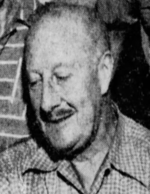 The Pittsburgh Press, August 15, 1955. A fifty-one-year-old stockbroker and father of three young children, Bertram M. Campbell was convicted of forging and passing three checks totaling $8,736 at New York City banks in 1937. The conviction, which followed a 1938 jury trial in the Court of General Sessions of New York County, rested on the testimony of four bank employees who identified Campbell as the man who passed the checks. Campbell was sentenced to five to ten years at Sing Sing Prison, from which he was paroled in 1941. In 1945, fifty-eight-year-old Alexander D. L. Thiel was arrested by FBI agents in Kentucky on charges of interstate fraud and taken to New York, where most of his alleged fraudulent transactions had occurred. On a hunch, New York City Detective Archibald Woods, who had arrested Campbell but had never been convinced of his guilt, arranged for the four witnesses who had identified Campbell to see Thiel. Three of the four thereupon repudiated their earlier identifications, saying they had mistaken Campbell for Thiel. Confronted with the witnesses’ identifications, Thiel confessed to the forgeries of which Campbell had been convicted and to scores of others, totaling, by his estimate, $600,000 between 1930 and 1945. In addition to federal charges pending against him, Thiel was indicted for forgery in New York County, where, at a court appearance on August 10, 1945, be came face to face with Campbell and apologized for the trouble he had caused him. A week later, Thiel entered a plea of not guilty to the charges, although, oddly, continuing to acknowledge the forgeries. He considered himself not guilty because, he explained, in his mind the fraud was justified. “I was motivated by the general bank crash some years ago,” he said. “A banker had sold my mother $12,000 in bonds that became worthless when the crash came. I still admit forgeries, but in my heart I have no qualms for what I did because of the loss of that money by my mother, which left her almost penniless.” Later in August, the New York County Criminal Courts Bar Association convened a public hearing regarding Campbell’s wrongful conviction, taking testimony under oath. Among those who testified was Wesley Irvine, a former Trust Company of North America teller who had mistakenly identified Campbell at his trial as the man who passed a forged $2,500 check at the bank in 1937. Irvine revealed that he had initially identified Campbell from a photograph on which a mustache had been imposed on a clean-shaven face. Before showing him the photograph, Irvine added, investigators told him that the bank president and the president’s secretary already had identified it. On August 28, Governor Thomas E. Dewey–turning the wheels of justice at record speed–granted Campbell a full pardon. Dewey, who had been New York County district attorney when Campbell was prosecuted, proclaimed the pardon “justice, not mercy,” adding that he would recommend "liberal compensation" for the 1,238 days Campbell had languished behind bars. In the ensuing weeks, Thiel switched his plea to guilty on the New York charges and was sentenced to five to ten years in Sing Sing, to be served after completing a four-year federal prison term to which he had been sentenced for the interstate violations that had been the basis of his arrest in Kentucky. In June 1946, the New York Court of Claims awarded Campbell $115,000 in damages for his wrongful prosecution. “I haven't been overpaid,” Campbell told reporters. “I wouldn't go through it again for two million dollars. I realize, though, that New York has done the best for me it constitutionally can.” Asked if he harbored grudges as a result of his ordeal, he replied, “I have no feeling against any of those who contributed to my conviction. I would not like to be in the shoes of the bank clerks who identified me as a forger at my trial. They must live with their consciences. Mine is clear.” Less than three months later, Campbell died of a stroke. He was only sixty years old. His physician attributed the stroke to the stress and humiliation he had suffered as a result of his unjust conviction and loss of liberty. - Rob Warden
|